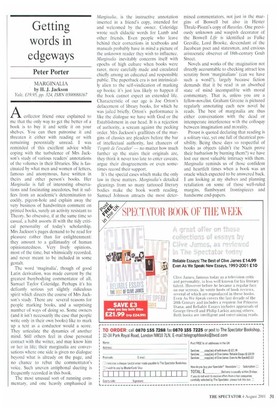Getting words in edgeways
Peter Porter
MARGINALIA by H. J. Jackson Yale, £19.95, pp. 324, ISBN 0300088167
Acollector friend once explained to me that the only way to get the better of a book is to buy it and settle it on your shelves. You can then patronise it and threaten it either with reading or with remaining perennially unread. I was reminded of this excellent advice while coping with the turbulence of Mrs Jackson's study of various readers' annotations of the volumes in their libraries. She is fascinated by what men and women of letters, famous and anonymous, have written in theirs and other person's books. Her Marginalia is full of interesting observations and fascinating anecdotes, but it suffers from an academic's determination to codify, pigeon-hole and explain away the very business of handwritten comment on printed books, surely an activity resistant to Theory. So obsessive, if at the same time so casual, a habit assorts ill with the tidy critical personality of today's scholarship, Mrs Jackson's pages demand to be read for pleasure rather than for enlightenment: they amount to a gallimaufry of human opinionatedness. Very lively opinions, most of the time, but whimsically recorded, and never meant to be included in some gestalt.
The word maginatia', though of good Latin derivation, was made current by the greatest busybodying commentator of all, Samuel Taylor Coleridge. Perhaps it's his defiantly serious yet slightly ridiculous spirit which directs the course of Mrs Jackson's study, There are several reasons for people marking books, and a surprising number of ways of doing so. Some owners (and it isn't necessarily the case that people write only in their own books) like to mark up a text as a conductor would a score. They articulate the dynamics of another mind, Still others feel in close personal contact with the writer, and may know him or her in life; their marginalia are conversations where one side is given no dialogue beyond what is already on the page, and no chance to rebut the commentator's voice. Such uneven antiphonal ducting is frequently recorded in this book.
The most unusual sort of running commentary, and one heavily emphasised in Marginalia, is the instructive annotation inserted in a friend's copy, intended for and welcomed by the owner. Coleridge wrote such didactic words for Lamb and other friends. Even people who leave behind their corrections in textbooks and manuals probably have in mind a picture of the unknown reader they wish to influence. Marginalia inevitably concerns itself with epochs of high culture when books were rarer, more carefully made and circulated chiefly among an educated and responsible public. The paperback era is not intrinsically alien to the self-vindication of marking up books; it's just less likely to happen if the book cannot expect an extended life. Characteristic of our age is Joe Orton's defacement of library books, for which he was jailed briefly. Orton's performance is like the dialogue we have with God or the Establishment in our head. It is a rejection of authority, a scream against the pecking order, Mrs Jackson's graffitists of the margins of classics are pleaders before the bar of intellectual authority, last chancers of Tesprit de l'escalier' — no matter how much further up the stairs their originals are, they think it never too late to enter caveats, argue their disagreements or even sometimes record their support.
It's the special cases which make the only law in these matters. Marginalia's detailed gleanings from so many tattooed literary bodies make the book worth reading. Samuel Johnson attracts the most deter
mined commentators, not just in the margins of Boswell but also in Hester Thrale-Piozzi's copy of Rasselas. One previously unknown and waspish decorator of the Boswell Life is identified as Fulke Greville, Lord Brooke, descendant of the Jacobean poet and statesman, and envious aristocratic observer of 18th-century Grub Street, Novels and works of the imagination not directly accountable to checking attract less scrutiny from marginalians' (can we have such a word?), largely because fiction demands that it be read in an absorbed state of mind incompatible with moral commentary. That is, unless you are a fellow-novelist. Graham Greene is pictured regularly annotating each new novel he reads. The best of marginalia are thus either conversations with the dead or intemperate interference with the colloquy between imagination and morality.
Proust is quoted declaring that reading is a solitary vice, yet one full of theatrical possibility. Being these days so respectful of books as objects (didn't the Nazis prove their barbarism by burning them?) we have lost our most valuable intimacy with them. Marginalia reminds us of those confident and heartfelt times when a book was an oracle which expected to be answered back. I am looking at my shelves and planning retaliation on some of those well-ruled margins, flamboyant frontispieces and handsome end-papers.


























































 Previous page
Previous page